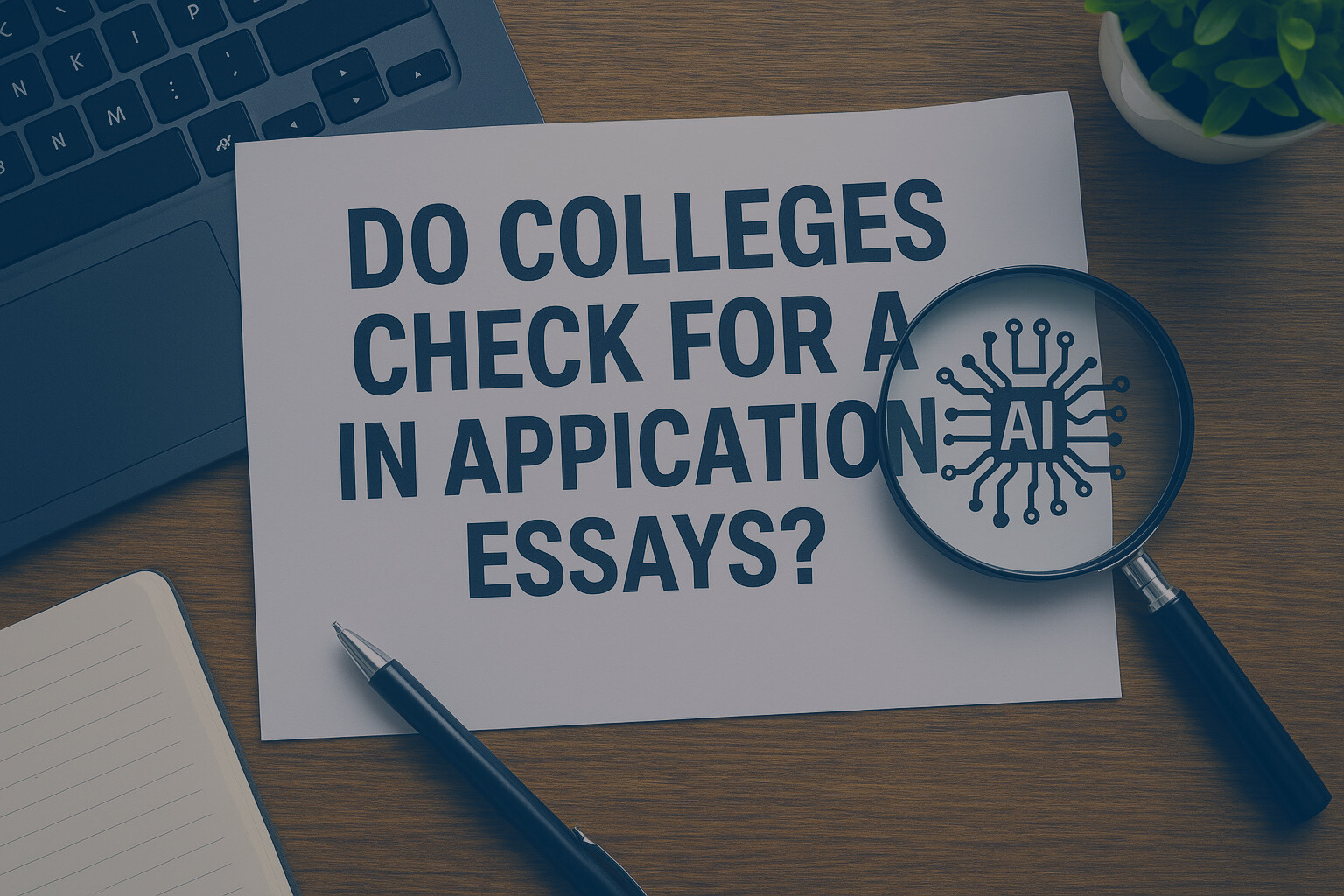Artificial Intelligence & Automationdifficulty
Do Colleges Check for AI in Application Essays
Colleges use AI detectors like Turnitin to spot fake essays. Find out how to keep your application authentic and stand out.
M
Muhammad Aamir Yameen
07-01-2025
5 mint read

Do colleges check for AI in application essays? In today’s digital admissions world, this question is becoming increasingly important. With the rise of AI tools like ChatGPT and other generative models, universities are beginning to wonder: Who really wrote that application essay?
In this article, we’ll explore how colleges are detecting AI in essays, whether the Common App uses AI detectors, and what tools like GPTZero are doing in the admissions space.
Why Are Colleges Checking for AI in Application Essays?
Colleges rely on essays to understand a student’s personality, values, and writing ability. But when essays are written by AI, they lose their authenticity.
Here’s why colleges check for AI in application essays:
- 🧾 To ensure authenticity and original thought
- ✍️ To evaluate actual writing ability
- 🎓 To promote academic honesty
- 📚 To maintain fairness among applicants
How Do Colleges Check for AI in Application Essays?

Colleges check for AI in application essays using a combination of tools and human judgment. Here's how they do it:
🔍 1. AI Detection Software
- Tools like GPTZero, Turnitin’s AI Writing Detector, and Originality.ai are being used by admissions teams.
- These tools detect patterns common in AI-generated text such as overly structured writing, repetitive sentence patterns, and lack of personal details.
🧠 2. Human Review
- Admissions officers are trained to spot essays that feel impersonal, generic, or overly polished.
- They cross-reference the essay with other parts of the application (e.g., SAT writing score, school writing samples).
🧾 3. Cross-Platform Integrations
- Some schools are exploring API-based integrations with platforms like the Common App AI detector.
What is GPTZero and Do Colleges Use It?
<img src="https://images.unsplash.com/photo-1677442137587-58d3f7c1a456" alt="GPTZero in College Admissions" style="width:100%; border-radius: 10px; margin: 20px 0;" />
Do colleges use GPTZero?
Yes, several institutions are experimenting with GPTZero or similar detectors to flag AI-written essays.
What Is GPTZero?
Why Is It Used?
- GPTZero supports academic institutions in upholding ethical writing standards.
Do Universities and Common App Platforms Use AI Detectors?
✔️ Common App AI Detector:
- Currently, the Common Application platform itself does not directly scan essays using AI detectors.
- However, universities may export submissions and analyze them using third-party tools.
✔️ AI Detector at University Level:
- Many universities use platforms like Turnitin with AI-detection features.
- Colleges also perform manual reviews when something feels “off.”
Example: A 2024 report by Inside Higher Ed revealed that over 60% of admissions counselors suspect AI usage in at least one essay.
Do UCs Use AI Detectors?
Do UCs Use AI Detectors?
- The University of California (UC) system has not officially confirmed using AI detectors.
- However, internal departments have the freedom to use tools like GPTZero or Turnitin AI.
UC Berkeley’s admissions officer in 2023 stated:
“Essays are meant to reflect individuality, and when that’s missing, we question the source.”
Key Signs of AI-Written College Essays

Admissions teams are trained to flag:
- ✒️ Overly polished grammar
- 🚫 Lack of personal anecdotes
- 📊 Unusual vocabulary for age group
- 🌀 Repetitive or emotionless writing
- ⚙️ Generic storytelling (no cultural or contextual depth)
How Do Professors Check for AI?
While our focus is on admissions, it’s useful to know how professors check for AI once students are in college:
- Professors use Turnitin AI Detector, GPTZero, and manual assessment.
- Essays submitted in class are compared with AI-generated writing samples.
- Professors often require students to explain or present their work orally.
Can ChatGPT Essays Pass as Real?
While ChatGPT and similar tools can write fluently, they often:
- Lack deep personal insight
- Repeat general themes
- Avoid controversial or unique viewpoints
- Fail when compared to writing samples or personal interviews
So, can AI-written essays fool colleges?
Not for long. AI detection tools and trained admissions reviewers are catching up fast.
Best Practices to Avoid Getting Flagged
If you're a student writing a college essay, here’s how to stay clear of AI detection issues:
✅ DO:
- Write in your own voice
- Share unique personal stories
- Edit your work — don’t let AI write it
- Use AI only for grammar suggestions, not content creation
❌ DON’T:
- Copy-paste AI outputs without personalization
- Assume colleges can’t detect it
Instructions for ChatGPT Users
If you're using ChatGPT to help with your essay:
- Use it for brainstorming, not for drafting.
- Rewrite everything in your personal voice.
- Add emotions, experiences, culture, and real anecdotes.
- Keep your essay aligned with your resume and application context.
💡 Pro Tip: Ask ChatGPT:
“Can you reword this paragraph to sound more like a 17-year-old student with a personal voice?”
Or:
“Rewrite with emotional storytelling and cultural background in mind.”
Final Thoughts
Do colleges check for AI in application essays?
Yes — and more frequently than ever before. As AI tools become more accessible, universities are investing in detection technology and training human reviewers to uphold honesty and integrity in the admissions process.
If you want your college essay to succeed, keep it real, personal, and authentic. A robot can write, but only you can tell your story.
FAQs
1. Do colleges use GPTZero to detect AI essays?
Yes, some colleges have started using GPTZero and similar tools to detect AI-generated content in applications.
2. Does the Common App have an AI detector?
Not directly, but universities can export and scan essays using third-party tools.
3. Do UCs use AI detectors in their admissions process?
The UC system hasn’t confirmed it, but departments may use AI detection tools independently.
4. How do professors check for AI-written work?
Professors use tools like Turnitin, GPTZero, and in-person oral exams to verify originality.
M
Muhammad Aamir Yameen
Software Engineer